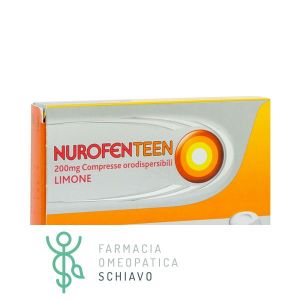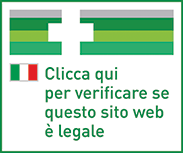Ship in Europe, Find out rates!
Nurofenteen 200 mg Ibuprofen Analgesic 12 Orodispensable Tablets

- box Delivery in Italy in 24/48 and free returns
- star3.000+ positive reviews
- dropboxOver 60,000 products in the catalog
Ibuprofen -based orodispensable tablets.
Therapeutic indications
Nurofenteen is used to relieve symptoms of mild to moderate pain such as headaches, toothaches and menstrual pains and to reduce fever.
Dosage and Posology
In adolescents over 12 years and adults Nurofenteen should be taken in a dose of 1-2 tablets per day every 4-6 hours. Do not take more than 6 orodispersible tablets (1200 mg of ibuprofen) in 24 hours.
How to use
Let the orodispersible tablets dissolve on the tongue and swallow the dissolved mass of the tablets. Fluid intake is not necessary.
Overdose
In case of overdose consult a doctor immediately. The following symptoms may occur: nausea, vomiting, stomach pain or more rarely diarrhea. In addition, headache, gastrointestinal bleeding, dizziness, dizziness, somnolence, nystagmus, blurred vision, ringing in the ears, low blood pressure, excitement, disorientation, coma, convulsions, loss of consciousness, hyperkalaemia, metabolic acidosis, prolonged prothrombin time / INR, acute renal failure, liver injury, respiratory depression, cyanosis and worsening of asthma in asthmatics.
Contraindications
- Allergy to ibuprofen or any of the other ingredients of Nurofenteen
- Difficulty breathing, asthma, rhinitis, swelling of the face and / or hands or hives
- Taking ibuprofen, acetylsalicylic acid or other similar pain relievers (NSAIDs).
- Severe liver failure, severe renal failure or severe heart failure.
- Stomach ulcer or stomach bleeding.
- Gastrointestinal bleeding or perforation following previous NSAID treatment.
- Cerebrovascular haemorrhage or other types of active bleeding.
- Unclear disorders of blood formation.
- Dehydration (caused by vomiting, diarrhea or insufficient fluid intake).
- Last 3 months of pregnancy
Side effects
Like all medicines, Nurofenteen can cause side effects, although not everybody gets them. Side effects can be minimized by using the lowest effective dose for the shortest possible time for symptom relief. You may experience one of the known side effects of NSAIDs (see below). If this happens, or if you have any concerns about this, stop taking this medicine and tell your doctor as soon as possible. Elderly people who take this medicine are at increased risk of developing problems associated with side effects.
- Common (may affect up to 1 in 10 users)
- Gastrointestinal problems, such as heartburn, abdominal pain and nausea, indigestion, diarrhea, vomiting, flatulence (wind) and constipation and slight bleeding in the stomach and / or intestines which in exceptional cases can cause anemia.
- Uncommon (may affect up to 1 in 100 users)
- Gastrointestinal ulcers, bleeding and perforation, inflammation of the oral mucosa with ulceration, worsening of existing intestinal disorders (ulcerative colitis or Crohn's disease), gastritis.
- Central nervous system disorders such as headache, dizziness, sleeplessness, agitation, irritability or tiredness.
- Visual disturbances.
- Various skin rashes.
- Hypersensitivity reactions with hives and itching.
- Rare (may affect up to 1 user in 1000)
- Tinnitus (ringing in the ears).
- Increased blood uric acid concentrations, pain in the hips and / or abdomen, blood in the urine and fever may be signs of kidney damage (papillary necrosis).
- Decrease in hemoglobin levels.
- Very rare (may affect up to 1 in 10,000 users)
- Esophagitis, pancreatitis, formation of membranous narrowings in the intestine (diaphragm-like intestinal narrowings).
- Heart failure, heart attack and swelling of the face and hands (edema).
- Reduction in the amount of urine and swelling (especially in patients with high blood pressure or reduced kidney function); swelling (edema) and cloudy urine (nephrotic syndrome); inflammatory kidney disease (interstitial nephritis) which can lead to acute kidney failure. If you have any of the above symptoms or if you have a general feeling of being unwell stop taking Nurofenteen and consult your doctor immediately as this may be the first signs of kidney damage or kidney failure.
- Psychotic reactions and depression.
- High blood pressure and vasculitis.
- Liver dysfunction, liver damage (first sign may be skin discolouration), especially over long periods of treatment, liver failure, acute inflammation of the liver (hepatitis).
- Problems in the production of blood cells - early signs are: fever, sore throat, superficial mouth ulcers, flu-like symptoms, severe exhaustion, nose and skin bleeding and unexplained bruising. In these cases, you must stop taking Nurofenteen and consult your doctor immediately. No self-medication treatment with analgesics and medicines to reduce fever (antipyretic medicines) should be done.
- Serious skin infections and soft tissue complications have been found during a chickenpox infection.
- Worsening of infection-related inflammation (e.g. necrotizing fasciitis) associated with the use of certain analgesics (NSAIDs) has been described. If signs of an infection develop or worsen, contact your doctor immediately to determine whether anti-infective / antibiotic therapy is required.
- Symptoms of aseptic meningitis with neck stiffness, headache, nausea, vomiting, fever or disorientation have been observed with ibuprofen use. Patients with autoimmune diseases (SLE, mixed connective tissue disease) can be more easily affected. Contact your doctor immediately if these symptoms occur.
- Severe forms of skin reactions such as red and blistering skin rashes (e.g. Stevens-Johnson syndrome, toxic epidermal necrolysis / Lyell's syndrome), hair loss (alopecia).
- Not known (frequency cannot be estimated from the available data):
- Respiratory tract reactivity including asthma, bronchospasm and dyspnoea.
Pregnancy and breastfeeding
Do not take this medicine during the last 3 months of pregnancy. Avoid using this medicine during the first 6 months of pregnancy unless prescribed by your doctor.
This medicine passes into breast milk but can be used during breastfeeding when taken at recommended doses and for short periods of time.
Ask your doctor or pharmacist for advice before taking any medicine.
Avoid taking this medicine if you are planning to become pregnant.
Special warnings
Nurofentenn should be used with caution in case of skin diseases (systemic lupus erythematosus (SLE) or mixed connective tissue disease), severe skin reactions such as exfoliative dermatitis, Stevens-Johnson syndrome and toxic epidermal necrolysis. The use of Nurofenteen should be stopped immediately at the first signs of skin reactions, mucosal lesions or any other signs of an allergic reaction.
Be careful in case of hereditary blood formation disorder (acute intermittent porphyria), blood clotting problems, gastrointestinal tract disorders (ulcerative colitis or Crohn's disease), high blood pressure and / or heart failure, impaired kidney function, liver disorders , asthma or allergic diseases, as you may have shortness of breath.
In case of hay fever, nasal polyps or chronic obstructive respiratory diseases, as there is an increased risk of developing allergic reactions, the use of the drug is recommended with extreme caution. Allergic reactions can occur in the form of asthma attacks (so-called analgesic asthma), swelling of the skin (Quincke's edema) or hives.
If you have heart problems, if you have had a stroke or if you think you are at risk for these conditions (for example if you have high blood pressure, diabetes or high cholesterol or if you smoke), you should discuss your treatment with your doctor or the pharmacist.
Medicines such as Nurofenteen may be associated with a slightly increased risk of heart attack (myocardial infarction) or stroke. Any risk is more likely with high doses of the drug and prolonged treatments. Do not exceed the recommended dose or duration of treatment, which is 3 days for adolescents, 3 days for fever and 4 days for pain relief in adults.
It is recommended that you avoid taking Nurofenteen if you have chickenpox. If you have been taking Nurofenteen for long periods of time, tests to evaluate liver function and kidney function regularly, as well as blood cell counts, are required.
Undesirable effects can be minimized by using the lowest effective dose for the shortest possible time. The elderly are at increased risk of developing adverse reactions. In general, habitual use of (different types of) pain relievers can lead to permanent severe kidney problems. This risk can increase in case of physical exertion associated with salt loss and dehydration. Therefore it must be avoided.
Prolonged use of any type of pain reliever for headache can worsen the symptoms. If this occurs or is suspected, you should stop taking Nurofenteen and consult your doctor. The diagnosis of drug overuse headache (MOH) should be suspected in patients who have frequent or daily headaches despite (or because of) regular use of analgesic medicines.
There is a risk of impaired renal function in dehydrated adolescents. Particular attention is required if you have recently undergone major surgery. NSAIDs can mask the symptoms of infections and fever.
Expiry and Retention
Keep this medicine out of the reach and sight of children. I did not use Nurofenteen after the expiry date which is stated on the carton and blister. The expiry date refers to the last day of the month indicated. Do not store above 25 ° C. Do not throw any medicines via wastewater or household waste. Ask your pharmacist how to throw away medicines you no longer use. This will help protect the environment.
Composition
One Nurofenteen tablet contains:
Active principle
200 mg of ibuprofen
Excipients
Ethylcellulose, precipitated silicon dioxide, hypromellose, mannitol, aspartame (E951), croscarmellose sodium, magnesium stearate, flavor (lemon - contains sorbitol).


